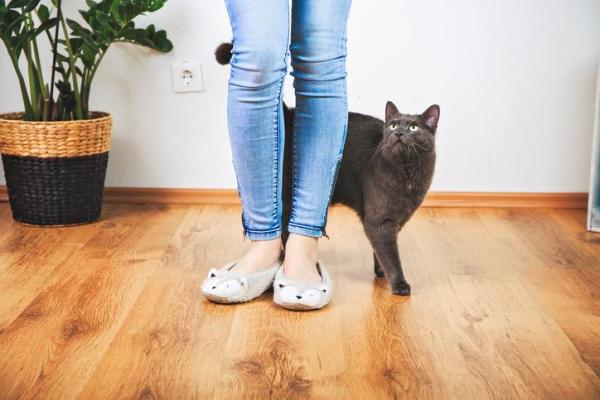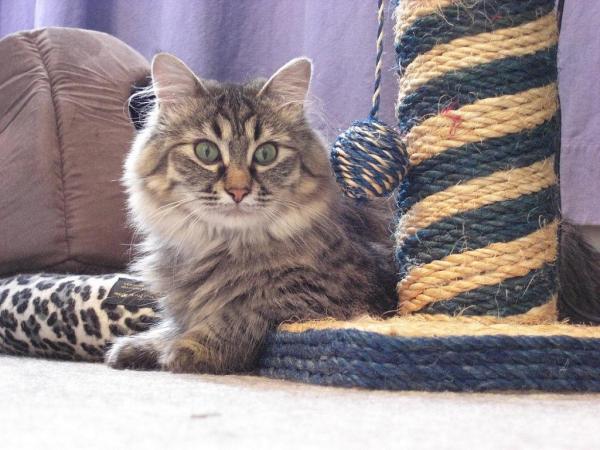My Cat Cries When I Leave



See files for Cats
When considering adopting a cat, many people see their supposed independence as a benefit. Irresponsible guardians will think they can leave the cat alone all day and they will not care. Although it will depend on the individual, cats are much more social than their reputation suggests. Some are more social than others, forming strong attachments to their human caregivers. While these attachments are generally positive, there are times when we can see signs of an unhealthy cat. Crying when we leave them alone is one such symptom.
At AnimalWised, we explain why my cat cries when I leave. By showing the reasons cats cry when left alone, we can find ways to improve their well-being and strengthen the bond we share with our felines.
Closed doors
As referenced in the introduction, a cat crying when we leave can be a sign of emotional upset. However, we start by explain a practical reason why cats meow loudly when we leave. Cats are famously curious and love to explore, especially if they live indoors with limited space. When we leave, we often close doors in the home, something which prevents cats exercising their exploratory impulses.
Closed doors are likely the reason a cat cries when we leave if they stop crying when the door is opened again. Since we cannot leave our doors open when we leave the home, we may need to find another solution. Cat doors are a good option for many families as it allows the cat their independence, without causing a security risk.
For house cats which are not allowed outside, we need to find ways to stop them feeling trapped. We can do this by keeping areas as open as possible. We can also add elements to their environment to encourage exploration such as scratching trees with different levels and wall mounted platforms which allow the cat to explore heights. If we allow them more room, we should see them crying less.
The cat doesn't want to be alone
Perhaps the most common reason why cats cry when we leave is that they don't want to be left alone. Cats doesn't necessarily know we will return when we leave, but they should adapt to a routine of our comings and goings. They will know when they will eat, sleep and have interactions. However, if a cat is insecure, they may think we won't return. Persistent meowing and crying when we leave indicates there is a problem which needs addressed.
Although there are insufficient studies to record true separation anxiety in cats, there appears to be anecdotal evidence to suggest it as a possibility. Cats do not need the same interaction, routines and education as dogs. However, they can develop strong bonds with their caregivers. They can become more dependent than they should be.
We can see this not only when the cat cries at our leaving, but when they are waiting by the door when we return, running to us when we make a noise or following us everywhere around the home. These are behaviors of healthy cats, as long as they do not show signs of distress. When they cry out or meow loudly, it can mean they are feeling anxious.
To stop such anxiety, we need to help the cat adapt to our routines. This can be difficult for some of us with jobs which take us away from home. During the time we are away, it might be helpful if they have another cat to keep them company. This is especially the case with more social cats.
Socialization may have been a contributing issue. When kittens are removed too early from their mothers, they do not have the ideal socialization period. They may have become too self-reliant on us and inappropriate fear has developed. This can make introducing the new cat difficult, but the end result may be worth it. When the cat has a new companion, they should cry less when we leave as their social needs are being met.
We should bear in mind the health problems associated with bringing a new cat into the home. They will need to be tested for immunodeficiency virus and feline leukemia. These are contagious diseases which have no cure. If the cat does not learn how to adapt or continues to cry when we leave, we should contact a feline ethologist to help address these issues.

Lack of basic care
While we need to think of our cat's psychology if they cry when we leave, we also need to consider whether the problem is rooted in their basic needs. More specifically, we need to know if they are lacking any of said needs. If this is the case, then they may be crying when we leave to implore us to provide whatever it is they lack.
If we don't feed the cat enough, they will fear our departure means they either won't get food or won't get it until we return much later. Neglecting a cat's basic needs will have various repercussions, They can become stressed and anxious, meowing out of desperation. This doesn't necessarily mean we don't feed them enough food. It might be we are inconsistent with their feeding schedules. As animals of routine, this can breed insecurity.
Before we leave the home, we need to ensure we have left sufficient food. We also need to ensure they have plenty of clean fresh water. Water should be replaced again when we return if we will be out all day, especially during warmer times of the year. Their litter box needs to be clean and they comfortable spaces to sleep. Once their basic needs are met effectively, you may see they stop vocalizing as much.
Boredom
Cats often cry or meow when they are alone out of boredom. It is more difficult for cats which live with other felines to be bored. Often they can entertain each other and enjoy peace when on their own. However, cats which live in a one-cat household can become bored very easily, especially if they do not have access to the outdoors.
Since our departure means they lose one of their most important interactions, it is understandable a bored cat may cry when we leave. To counteract these feelings of boredom, we need to provide sufficient environmental enrichment. This requires provided various sources of stimulation throughout the home, both physical and mental.
Some ideas to improve environmental enrichment include:
- Scratching trees: scratching posts are very useful as they allow the cat opportunity to maintain their claws. However, when we add platforms, levels and toys, it can also be a great way to keep the cat entertained at the same time. We can purchases many different types in a pet store, but you can also make your own to provide some bespoke elements to prevent your cat becoming bored.
- Wall platforms: as with opening up space, wall-mounted platforms can help entertain the cat and prevent boredom.
- Interactive toys: interactive toys and intelligence games for cats are some of the toys cats love most. The reason is because they help stimulate the cat more effectively. They do this by providing challenges for the cat to overcome, often in the form of hiding food which the cat needs to work out how to remove. We can even make basic intelligence games by hiding food in a plastic bottle. A better-stimulated cat is less likely to be upset when left alone.

Recommendations for one-caty households
Now we know the reasons why cats cry when their guardian leaves, we should look at how to prevent this from happening. Even if you cat does not have anxiety when you leave the room or home, these tips can help improve their general well-being:
- If we can choose our departure time, it is better to be absent in a period during which we know that our cat is more likely to be sleeping.
- Before leaving, it is worth spending a few minutes playing games or pampering the cat. A calm, tired cat is more likely to spend the next several hours sleeping rather than crying.
- Offering food before leaving also increases the chances that our cat will go to sleep on a full stomach, as we have discussed above.
- We can also reserve new toys to give them just before our departure. If we can arouse their interest, they will not be so aware of our absence. We do not have to buy something new every day, but we can store and take out toys again or even give a basic toy such as a rolled up piece of aluminum.
- Leaving on music, TV or other sounds can help the home feel more lived-in and make the cat feel less anxious.
- We have to make sure we leave them clean water, food and litter, as well as their favorite accessible toys.
- Leave the doors open where possible and give them as much space as we can afford. This will help to keep them engaged and not feel trapped. Install platforms, scratching trees and anything else which can make our absence more bearable.
- Adopt a new cat if we are able to meet the care needs of both cats.
Apart from crying, below you can check out a video on what cats do when left home alone:

If you want to read similar articles to My Cat Cries When I Leave, we recommend you visit our Facts about the animal kingdom category.







